I was recently invited to the Gartner marketing briefing; ‘Excelling Through Digital Disruption in the World of Marketing’. This event had an illustrious collection of speakers, including: Andrew Frank, Prof Scott Galloway, and Alex de Fursac Gash.
The Gartner Marketing Family
The event kicked off with a brief presentation by Gartner on its new offering to the marketing space. With Gartner’s acquisition of CEB & L2, they have now added further depth to Gartner for Marketers and an increased ability to provide objective advice – rooted in research, peer-driven insights, and data. The snapshot below illustrates the businesses’ new propositions and Gartner’s commitment to driving marketing/martech services.
Multi-channel marketing is still a big deal
Alex de Fursac Gash’s talk focused on what’s happening now in Gartner’s approach to marketing technology. He began by asking his audience to consider an important question relating to multi-channel marketing: why does it matter? It matters because effective, targeted multi-channel management leads to elongated conversation with an audience. Whilst omnichannel is ideological, multi-channel is pragmatic. To help frame its evolution and adoption, Gartner developed a multi-channel marketing maturity model. Currently, about 69% of companies are between levels 3-4.
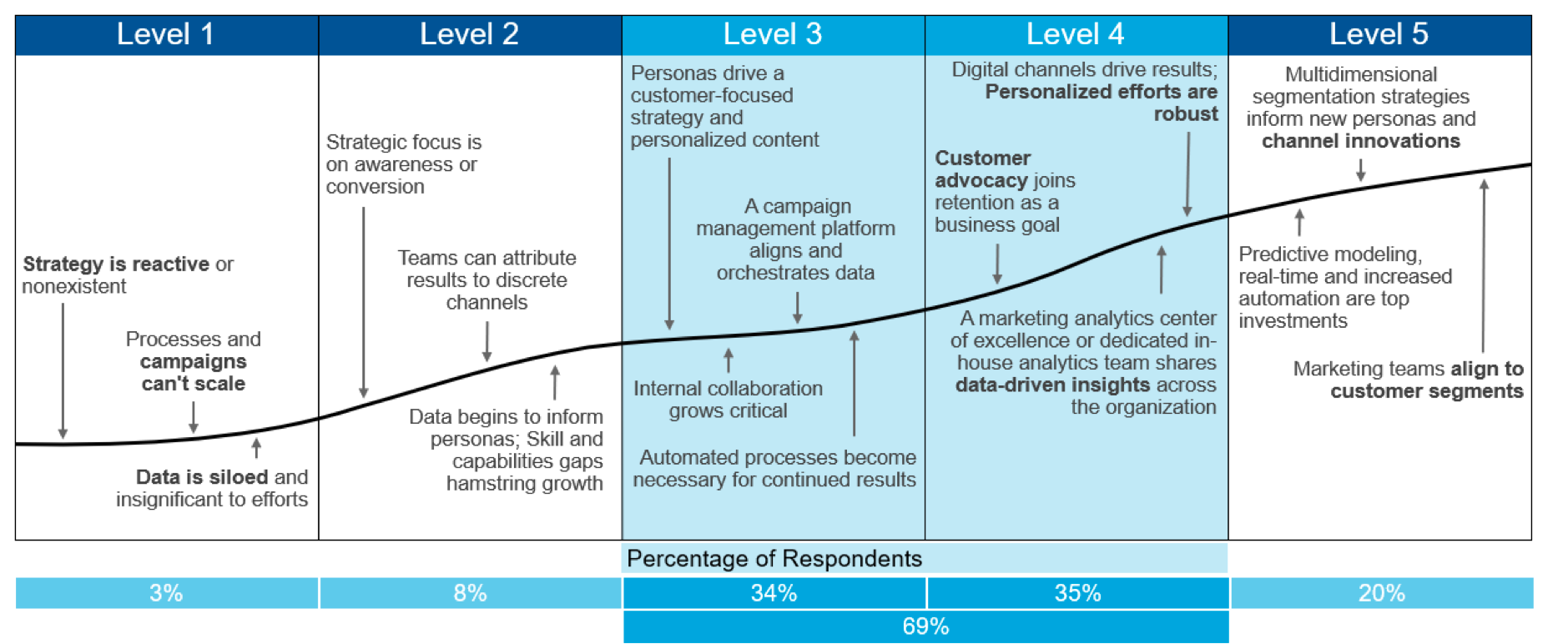
Over the last two years, we have seen rapid advancement in multi-channel maturity across many organisations. Gash puts this down to having a strong multi-channel marketing leader, as well as the effective deployment of marketing technology. But how do we continue to drive longer, deeper conversations with an audience? Funny you should ask, Gartner have designed another framework for that called CUPID.
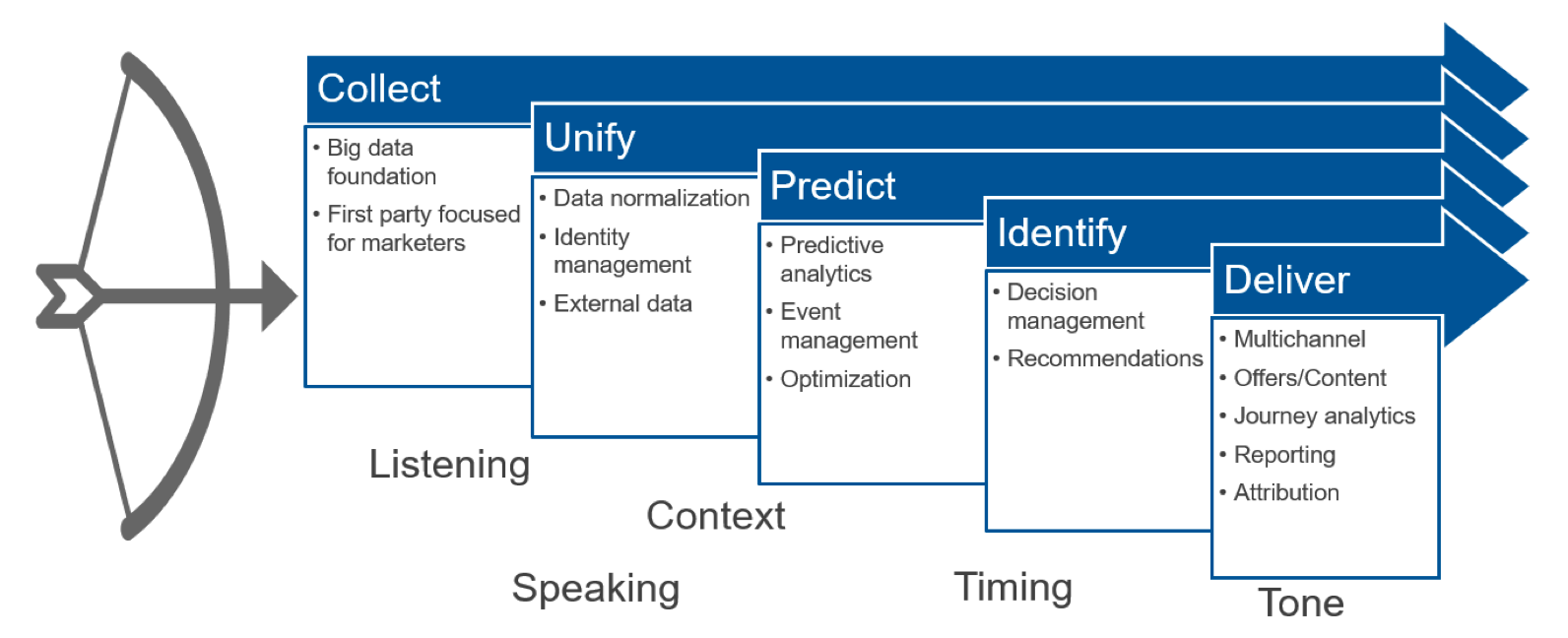
This framework can help enable targeted natural conversations at scale. Through personalised communications that revolve around consumers’ passions, success and growth can be achieved. This level of context and personalisation and multi-channel execution is only possible through the implementation and adoption of the right martech – and Gartner’s magic quadrant can help identify with your selection process in this.
Getting Frank about Future-Proofing
Unlike Alex, whose talk focused around the present, Frank focused on five of Gartner's predictions for the future, and how we prepare for the possible reality of these predictions. How do we (as companies), fight against disruptive platforms in the future? And how do we prepare for the inevitable disruption of AI and machine learning in analytics? Frank offers 5 practical recommendations to prepare for these possibilities.
1. Strengthen four brand attributes that are key to surviving disruption: relevance, authenticity, value and evidence.
Companies need to address the increasing decline in brand perception caused by “middle-men” platforms such as Facebook, Amazon and Google by ensuring that brands deliver relevance and authenticity.
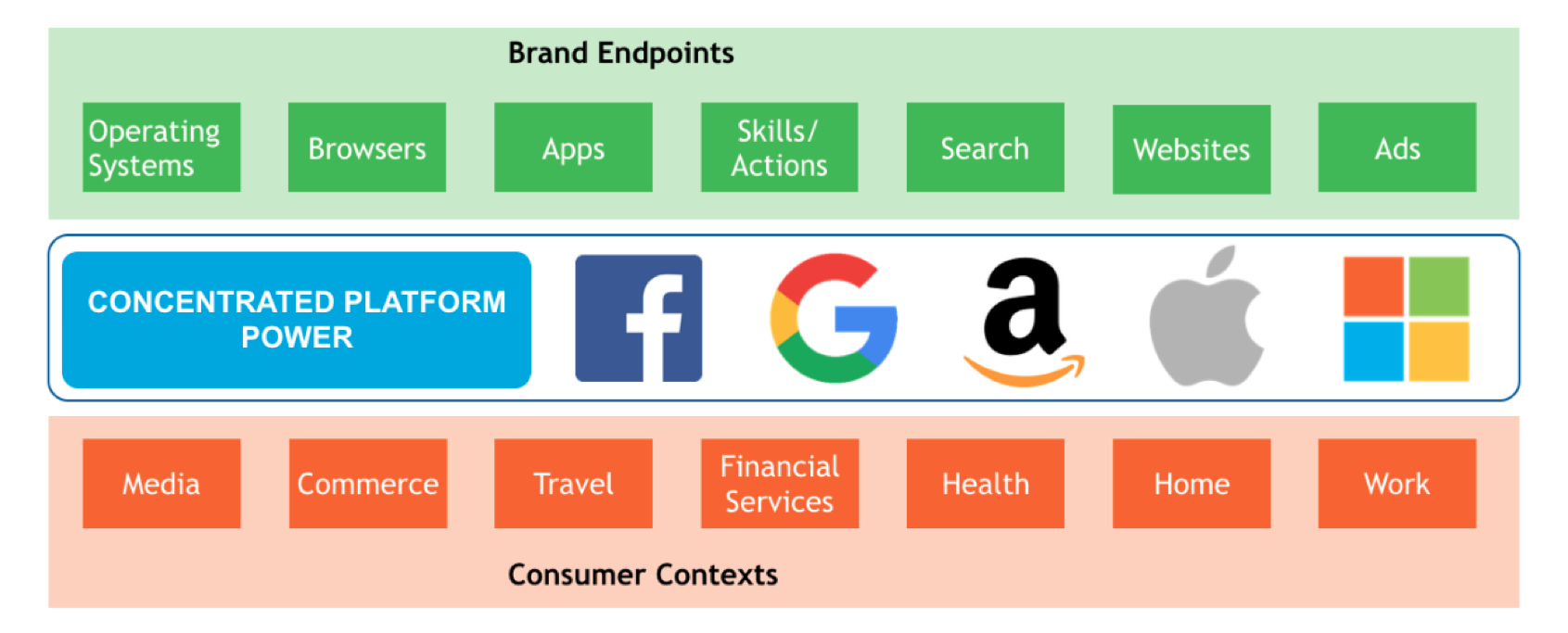
2. Hire or train marketers to deliver high quality content
A torrential demand for content production is another potential threat. Marketing investment in personalisation technology has grown rapidly as a result of this trend.
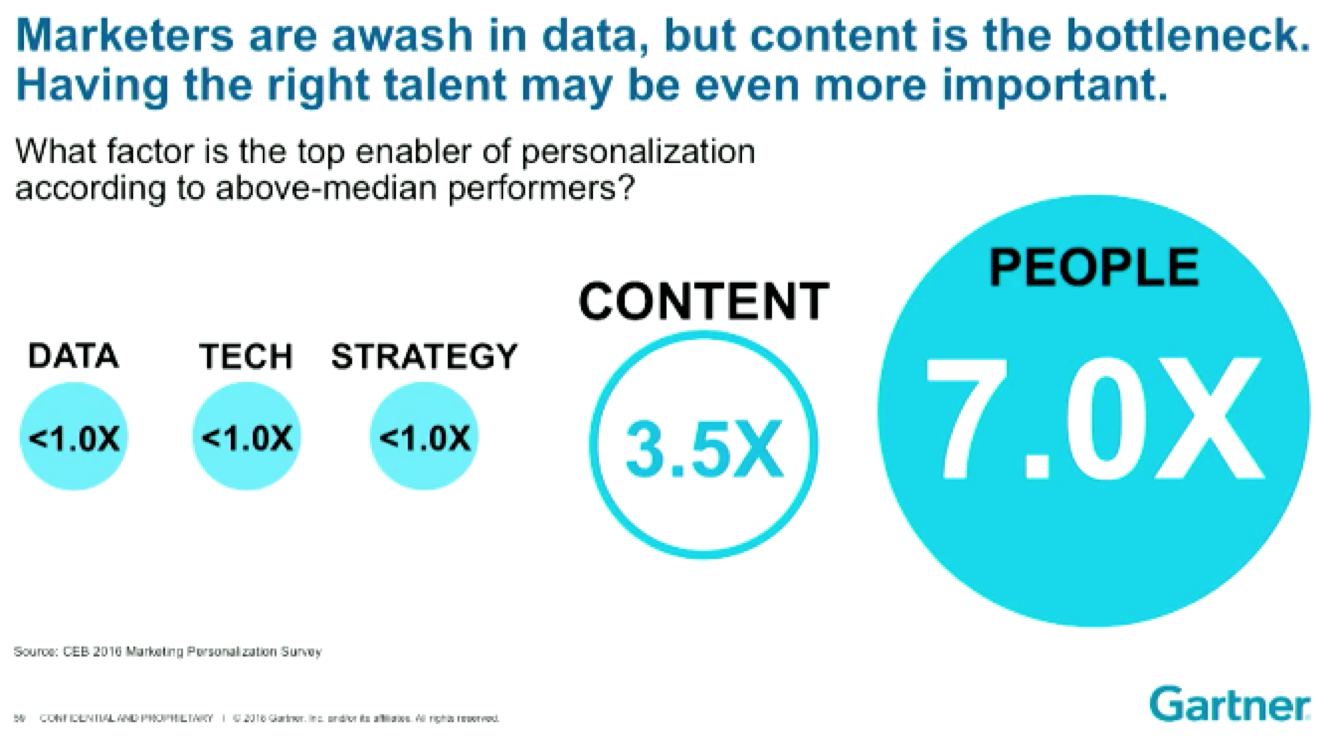
As shown by the graphic above, people make the largest difference to content creation. This poorly understood fact prevents companies from maximising their content through techniques such as in-house, cross-functional teams. In order to conquer the issue of constant demand for personalised content, Frank urges people to: ‘reimagine the creative brief’, by thinking about content, segmentation and messaging on a whole new scale.
3. Experiment and continuously update customer journey maps that incorporate voice- and visual-driven search
First, you need to understand how buying journeys will change and why. Today, roughly 20% consumers use a personal virtual assistant (VPA), of which 17% use VPAs for personal shopping. If you know exactly what you want to order, voice search can decrease the order time by a whopping 80%. Visual search, on the other hand, makes online shopping easier by using a photo on their smartphone or screenshot from the web to browse similar products.
4. Invest in a balanced team of talented marketing generalists and encourage specialists to expand their skills set
Gartner predicts that by 2022, 40% of specialised mobile and social marketing jobs will be absorbed into generalist roles or be replaced by automation. In other words, marketing organisations have an increasing need for T-shaped talent - marketing generalists that have a wide skills set and multiple areas of deep expertise. To prepare for this shift, it’s essential to invest in multichannel skills, realign budgets and roadmap how AI may affect future roles.
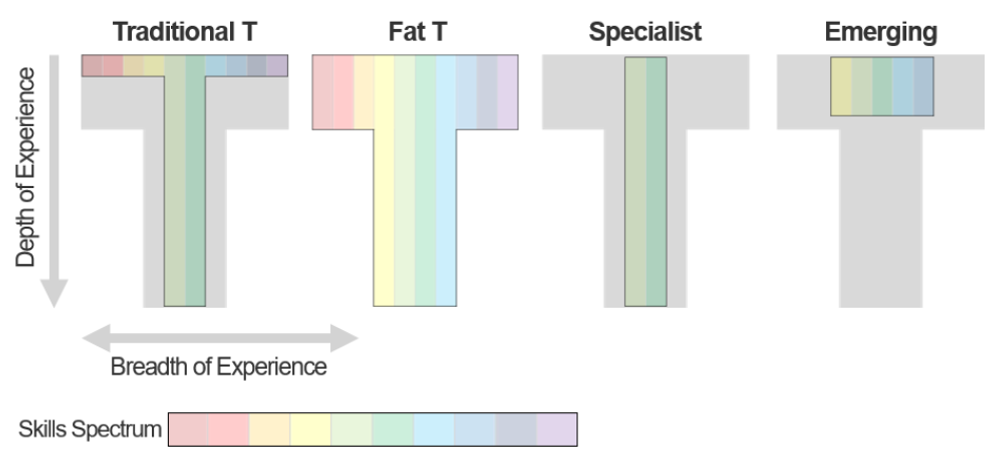
5. Measure the impact to your workforce when evaluating and deploying new AI-driven marketing technologies
AI will not only disrupt mobile and social marketing, it also threatens to cannibalise today’s marketing data analysts and specialists. Why? Marketing analytics is resource intensive; it takes almost 10% of the average CMO’s budget and is the most difficult area to hire qualified candidates. To prepare for the disruption of AI, Frank recommends building more flexibility into your team, expanding the team that evaluates marketing technology.
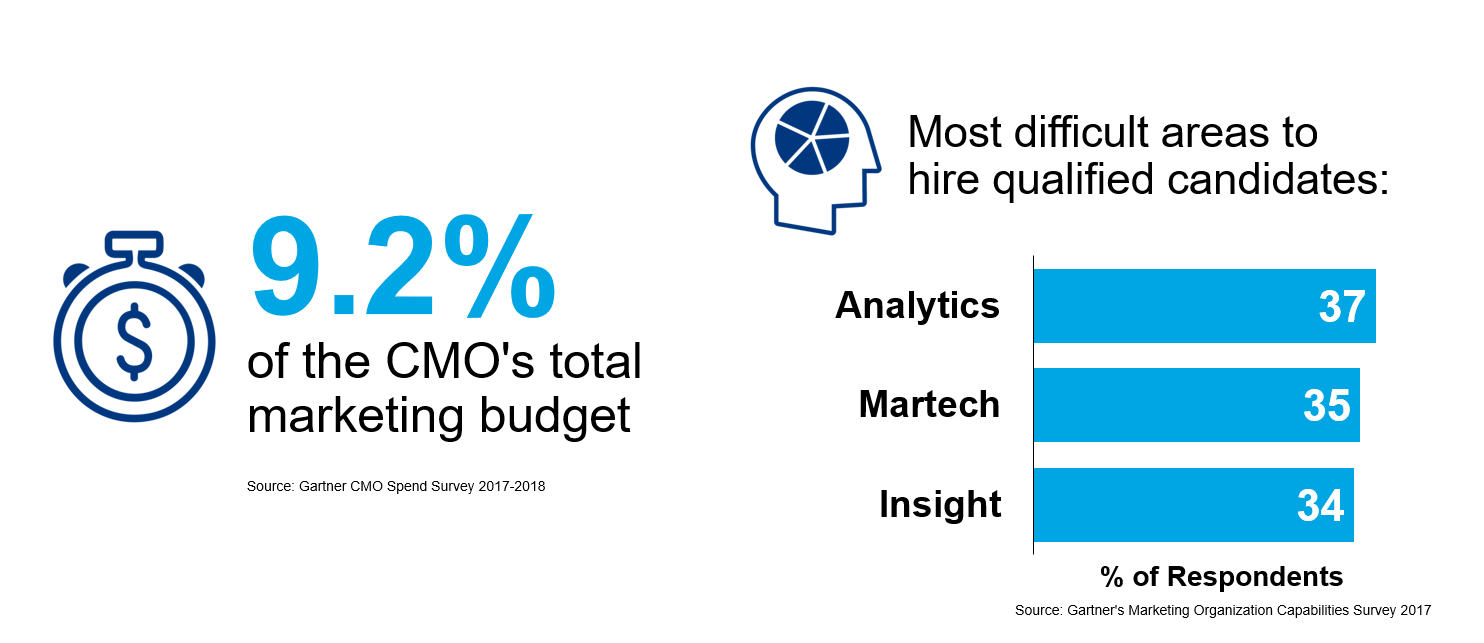
Changing the technology landscape
Scott Galloway Founder of Gartner L2; Professor of Marketing, NYU Stern and author of "The Four". Delivered the final session of the day.
Galloway gave an emphatic presentation on why "The Big Four" Amazon, Apple, Facebook, and Google should be broken up. He describes them as 'evil’; from tax avoidance, destroying jobs, fake news and much more - but this isn't the reason for them to be broken up. It's that breaking them up would fuel capitalism, by moving them from an ecosystem of four to multiple separate companies would create more jobs, a broader tax base and greater regulatory control.
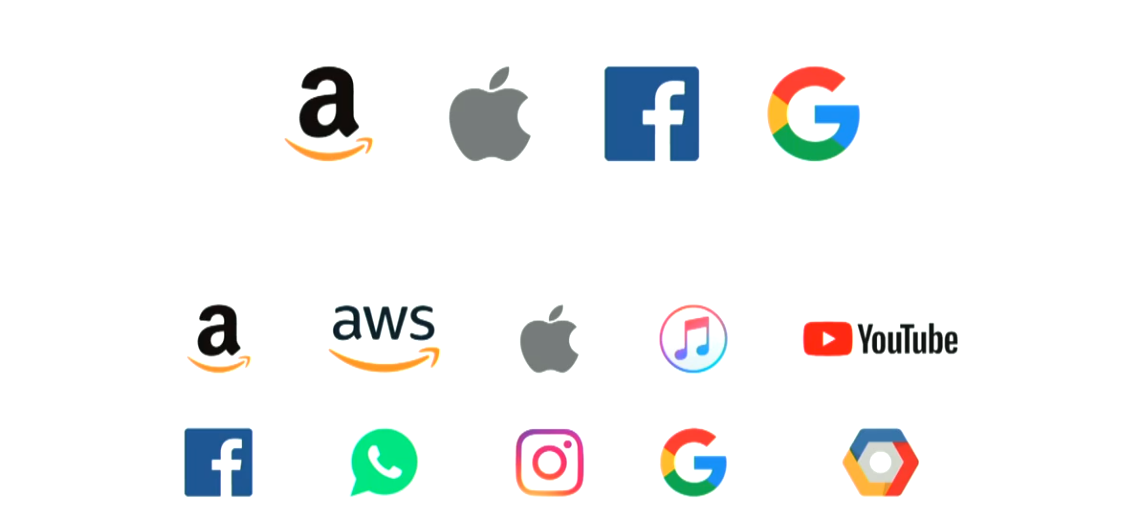
Galloway highlights the risk of such a large concentration of wealth among a few companies and strongly advocates policy change to break up The Four. If there is significant changes to these, the future of marketing could appear very differently. However, this doesn't seem likely right now.
To get highlights of the event and content presented please email Gartner directly.
